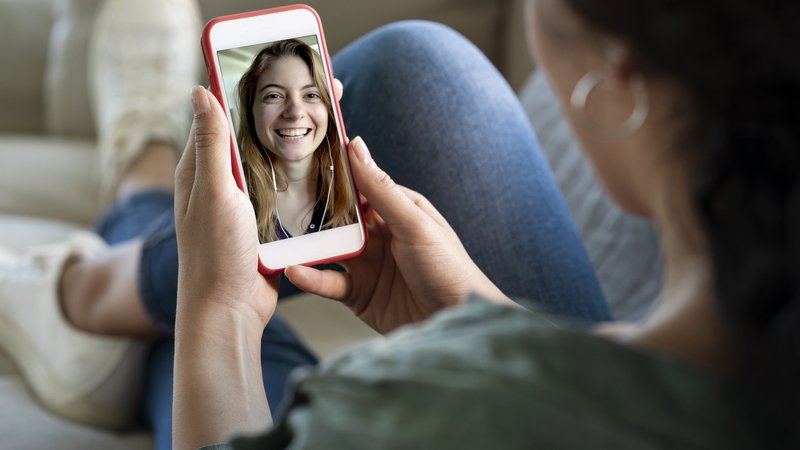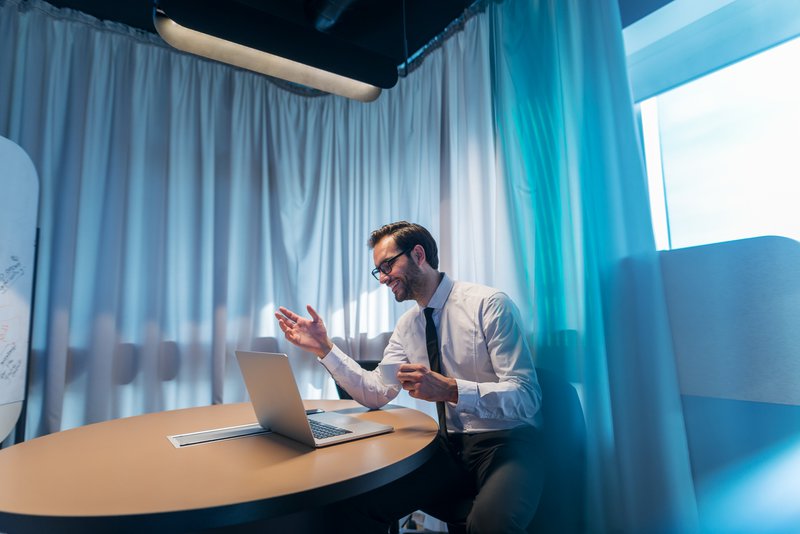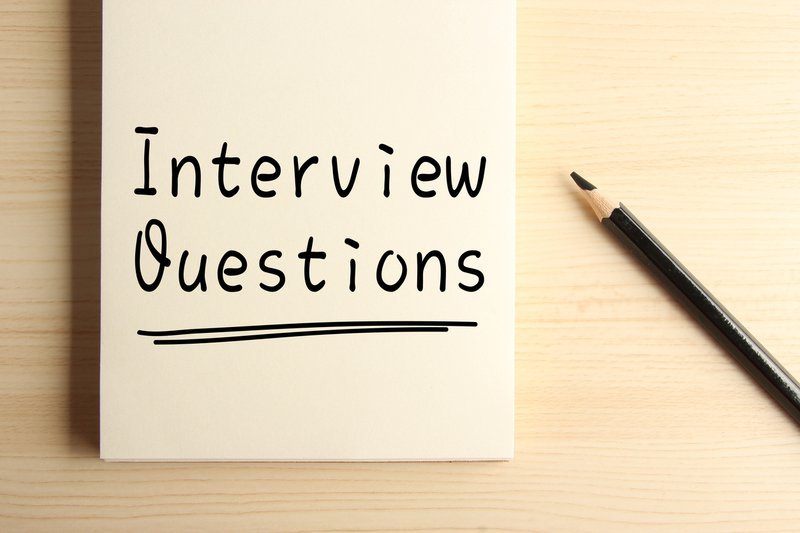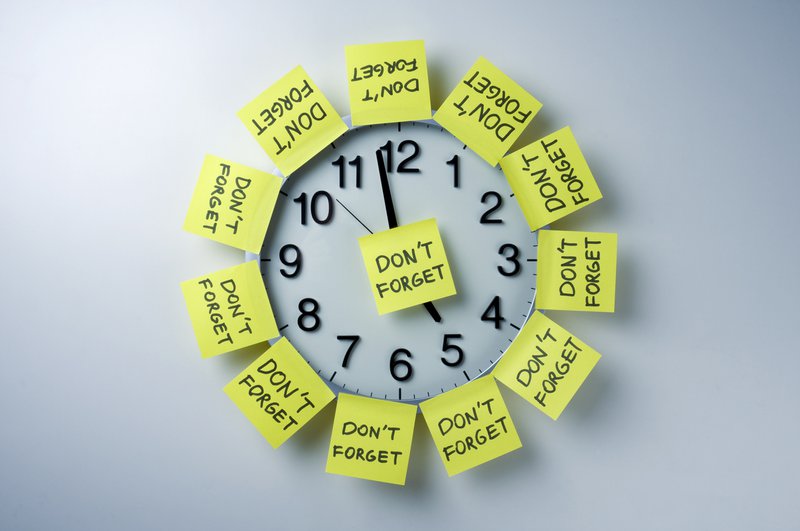Envision a Skype interview, and you instantly think of that meme of a guy in a shirt wearing a tie with no pants on, sitting in front of his computer. Although a remote interview means you spend all the time sitting down, you should keep your pants on!
With everything and everyone so connected today thanks to the internet, companies are finding that they are no longer confined to their local pool of talent. Using video call applications like Skype or Google Hangouts, HR managers can interview and screen candidates worldwide.
Although designed to imitate a face-to-face interview, a remote interview has some unique challenges and benefits of its own. Following 14 magical tips, you’ll ace that remote interview with no problem at all.
1) Dress Appropriately For The Remote Interview
Like any regular interview, a remote interview requires you to dress the part. Formal attire might be the most appropriate form of clothing, but it isn’t always necessary.

It depends on the company’s attitude to dressing (which you can glean from their website and official photos from the workplace) and the occasion. If you notice employees dressing informally, skip the suit and wear something clean yet casual. Something you would wear to a nice dinner out with your in-laws, rather than the sweatpants you live in all week.
And as I’ve said before, don’t skip the pants! You never know. You might need to reach for something or run because there’s an earthquake. You don’t want the interviewer to see that you were only half-dressed. Plus, dressing up from head-to-toe psychologically puts you in a professional mood.
2) Have A Backup Plan
Borrow your brother’s laptop if yours doesn’t function properly, and have it set up with the video call application and equipment.

You can’t always be sure of the power or WiFi connectivity either, so ask your neighbor in advance if it would be all right with them if you could use their WiFi for the interview as a backup if yours doesn’t work.
3) Do A Practice Remote Interview
How often does an average person video call their friends and family? Apparently, not even a quarter of Americans.

According to a Pew Internet & American Life Project study, only 19% of Americans have tried video calls or video chat online or on mobile. People prefer to message or voice-call others than sit awkwardly in front of a screen and talk face-to-face.
Practice interviews with a friend to familiarize yourself with the application and body language of speaking with a face on the screen.

Also, test your mic and speaker levels beforehand. A remote practice interview will allow you to find the best position and camera angle before the actual interview. Using your computer’s webcam application, you can record a practice session with some rehearsed answers to see how you look.
4) Look Into The Camera
It’s natural to look at the interviewer’s face when you have a remote interview, but watching on the other side of the screen will look as if you are looking down.

So try and focus on looking at the camera when you speak, so you are looking at them in the eye. You can look at the screen when talking, but otherwise, try to focus on the camera.
5) Keep Your Notes And A Blank Paper Nearby
One of the best things about a remote interview is that you can bring anything into the remote interview without seeing it. You can keep notes nearby to glance at when you want to back up your arguments with facts.

A blank piece of paper and a pen can also be handy to jot something down or clarify your thoughts during a complicated question. However, avoid writing too much during the interview, as it will look like you are distracted and uninterested.
6) Set The Background And Lighting For The Remote Interview
An interview screams professionalism, so you must keep the background as professional as possible. Keep it clean, uncluttered, and free of any personal items. Your environment should be anything that doesn’t detract attention from you; a blank wall or a bookshelf gives the right vibes.

Lighting is equally essential. You look better with better lighting. It would be best if you were careful to avoid light sources behind you in the frame, as the camera will lose focus on you and instead show you as a silhouette.
Have a lamp in front of you to shed light on your face, but not too close as harsh light will diminish your features, making you look like you’ve lost your nose!
7) Choose A Quiet Place For The Remote Interview
Avoid public places. Have your interview at your home, in the quietest room with the best light.

Try to have a quieter place for the interview as it adds to your image formation in the interviewer’s eyes. If your home is too noisy, go to a friend’s house. It will look highly unprofessional if your kids make a racket in the background or if the TV is on.
Internet calls are not always smooth, so speak clearly and keep your end of the line noise-free. All this will only make you look responsible in front of the interviewer.
8) Be Confident
This tip goes for all interviews, but many tend to misunderstand the meaning. They often mistake confidence with arrogance, and therein lies their rejection.

Confidence can be easily shown by being excited and enthusiastic about the job. On the other hand, arrogance is the unnecessary over-confidence that only goes well in movies.
The interviewer should never feel that you are taking the interview for granted, but he shouldn’t think you’re quickly taken aback. Hence, it would be best if you struck the perfect balance to rock your remote interview.
9) Anticipate Questions And Be Ready
It might sound a little too far-fetched, but you can easily anticipate what the interview would be like given the proper research.

At the very least, you should be aware of the company and the position you’re applying for and not just theoretically. It won’t be a bad idea to pose questions by yourself and answer them to prepare for the interview.
Even if the questions turn out to be a little different, you’ll know how you should go about answering them.
10) Be Well Rested And Ready
Interviews always come with an alarm and nervousness, leading to you not resting enough because you’re too eager to take the interview.

Such relentless focus can lead to a terrible interview, and it is for this reason you should be well-rested and refreshed before you sit for your remote interview. Make sure you have had a sweet sleep the night before the interview.
11) Be Prepared To Answer The Basic Questions As An Expert
If you are applying for a job, be prepared to answer basic questions, like “Why have you applied for this job?” Here are some questions that you should prepare for an interview:
- Tell us about yourself?
- Why should we hire you?
- Where do you see yourself in five years?
- What are your biggest strengths and weaknesses?

Often, applicants fail because they don’t prepare for these types of questions. Hence, it is essential to take this issue head-on and be very clear regarding why you choose to go for a remote job, your strengths and weakness, or your plan for your career.
After all, the key to cracking your remote interview is to be well-prepared to answer your motivations.
12) Be On-Time, Even For A Remote Interview
Many people take remote interviews very casually, which can be disastrous to landing a remote job. They might sound casual, but the big companies don’t expect casual behavior right up from the interview.

Hence, one needs to be very professional as you would’ve been on a regular interview. And by being on time for the interview, you’d get off to a good start.
13) Show Your Communication Skills
In a remote interview, the first and foremost thing you need to establish is uninterrupted communication.

Apart from a stable internet connection, you’ll have to know when to speak and when to listen to the question carefully. The worst you can do is start talking simultaneously as your interviewer.
Although this goes for all interviews, the importance of maintaining flawless communication becomes even more critical when it comes to remote interviews.
14) Ask Relevant Questions
An interview isn’t just about the interviewer asking questions. You will also get the time to clear any doubt you might have. You don’t want to come off as utterly clueless about questions during a remote interview.

Make sure you prepare all the questions you will ask if you get the chance. Doing so will not only clear your queries, but the interviewer will realize how well you’ve prepared and the extent of your research.
These little things are often ignored but often turn out to be the deciding factor for landing the job.
In Conclusion
The keys to preparing well for a remote interview are pretty much like a standard interview. Yet, there are differences, and you can refer to your notes and have a glimpse of reference, which is not the case with regular interviews. But to make sure that you don’t have to steal glances of your notes, research, and proper preparation by following the points mentioned above becomes vital.
After all, the difference between you landing the job and not doing it can be the one aspect you chose not to prepare and polish. So, make sure you leave very little on the shoulders of fortune and take the interview well prepared.
If you want to learn more about job interviews, check our topics below:
- Preliminary Interview: Meaning, Purpose, And Tips To Ace It
- What Is A Working Interview And How To Outperform In One?
- What are Formal And Informal Interviews? How to succeed?
- Remote Interview: 14 Tips For a Successful Interview
- Interview Outfits: What To Wear For a Successful Interview
- What Are Open Interviews? 10 Ways To Ace Them
- Types Of Interviews And Ways To Ace Them
- 10 Indispensable Tips For a Successful Job Interview

Christian has over ten years of experience in marketing agencies. Currently, he has been dedicating his time to a tech startup and also writing for major publications. He loves podcasts and reading to keep up with the latest trends in marketing.
